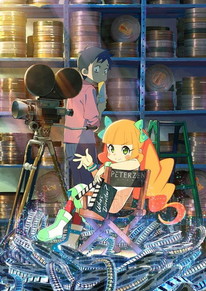Review
by Kim Morrissy,Pompo: The Cinéphile
| Synopsis: |  |
||
Operating out of the movie capital "Nyallywood," Pompo has been shooting one B-grade entertainment flick after another that anyone would enjoy. One day, Pompo's "movie buff" assistant Gene reads a new script written by Pompo, and is moved by its exquisite story. However, Pompo tells him to direct it. Thus, Gene takes on his first directing gig. Meanwhile, Natalie, an ordinary girl who just arrived in town with movie actress dreams, has been discovered by Pompo. |
|||
| Review: | |||
What a delightful, exhilarating film to watch. Pompo: The Cinéphile is the perfect showcase of anime cinema – with equal emphasis on both words. Every single frame is packed with vibrant colors and flavors, with snappy transitions between animation-like and cinematic expression. Packed with visual homages and a deep abounding love for film in all its forms, from campy B-movies to Oscar-winning material, It's a must-watch if you love cinema in any form. As for the story, it's not the highlight, but it's serviceable. It might be a film about making a film, but don't go into it expecting to learn about the intricacies of the process in the way that Shirobako, for instance, teaches you about anime. Right from the opening minutes, it's full of elements that discard believability, starting with the eponymous character of Pompo. She might be a preteen-looking girl prone to dramatic flourishes, but she's also apparently a veteran film producer. There's a bit of explanation about how she's the granddaughter of a famous producer, but it's really not trying to convince you that this is how the film industry works. Naturally, the plot itself is larger than life and full of convenient turns. The protagonist Gene and the scrappy actress Natalie both quickly get the chance to prove themselves with an ambitious feature-length film. Financial difficulties arise when Gene decides that he needs to do additional filming after the initial shoot, but there's never any question about his ability or judgment, nor is interpersonal drama a focus. The story is more about reveling in the experience of creative expression than in portraying the realities of filmmaking. "Where's the drama, then?" you might ask. Well, that's where the "film within a film" narrative device becomes relevant. The film that Gene directs, called Meister, follows a grizzled musician whose pursuit of the ideal song isolates him from others. As the stories of both Meister and Pompo progress, the characters of Meister end up embodying the dramatic confrontations and catharsis that take place within Gene as he struggles with himself to create the perfect final cut. My favorite part of the film is how it visually represents the editing process, because it's where the real battle takes place. The imagery of Gene picking up a blade as he kills his darlings one after another is such a vivid depiction of the difficulties of realizing one's creative vision. Scenes like this make it clear that you don't need to come up with an external conflict to depict the trials and tribulations of an artist. On the other hand, I can sort of understand why one might feel underwhelmed by a film like this. It might seem like a waste to see such brilliant visual creativity applied to such a bare-bones story. Honestly, though, I think that in itself is an impressive feat. Pompo makes its appreciation for B-movies obvious from the start, with its unabashed depiction of a campy monster film headed by an actress in a bikini. In those sections, the camera lingers on the boobs and ass, as if to proclaim, "This, too, is cinema!" So when the characters apply their energies to create a film with an Oscar bait plot, there's no feeling of snobbishness about it. In Pompo, film is all about finding an image that speaks to the viewer, regardless of the subject matter. I find that outlook refreshing. Pompo is an ideal work of entertainment. It's such a likable film from start to finish, and what it lacks in strict accuracy or drama it more than makes up for with its energetic animation and visual charisma. It has a spark that will give anyone who watches it the hunger to create something of their own. Oh, and here's the best thing – it's exactly 90 minutes long. |
| Grade: | |||
|
Overall : B+
Story : B
Animation : A
Art : A+
Music : B+
+ Energetic visuals and inventive presentation, captures the joys and difficulties of creative expression |
|||
| discuss this in the forum (20 posts) | | |||
| Production Info: | ||
|
Full encyclopedia details about |
||